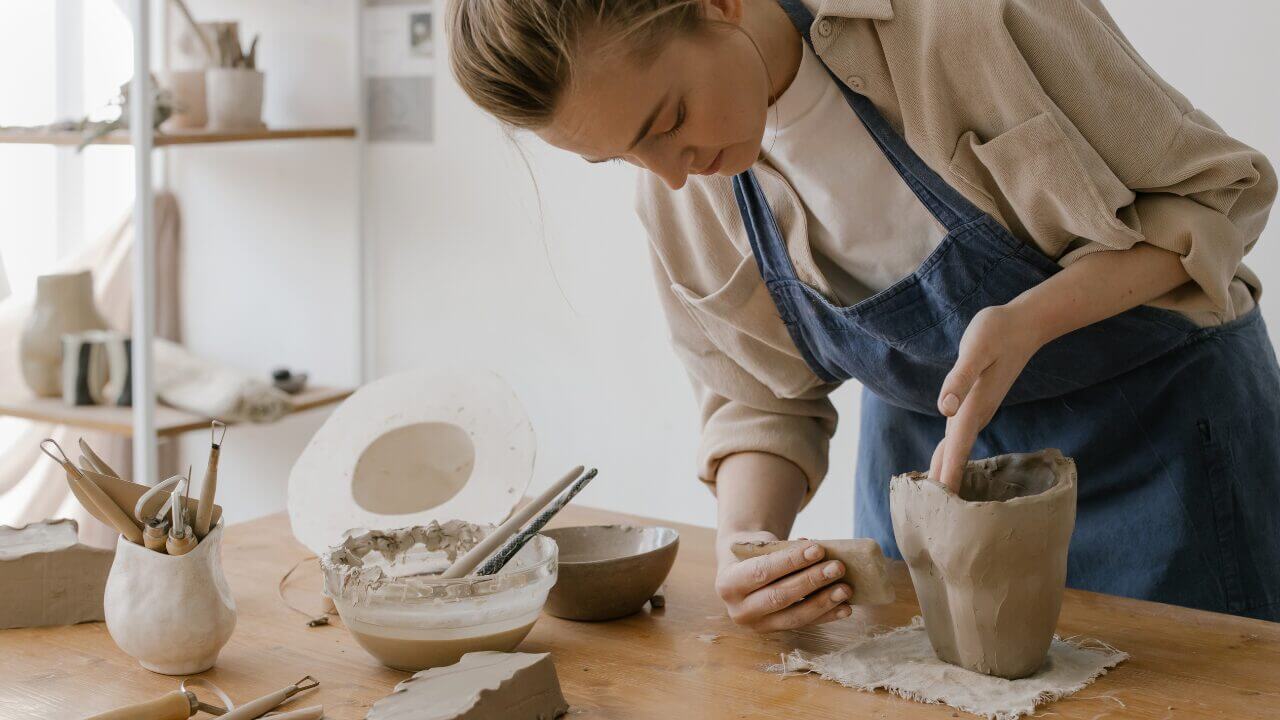Language:
How to Start Your Own Pottery Business: doola’s 2024 Guide

You’ve dabbled in clay, mastered the art of the wheel, and now it’s time to turn your passion into profit.
Yes, we are talking about the pottery business you’ve been dreaming to build.
And doola is here to help you start your own pottery business and fulfill your dreams of forming a US-based Limited Liability Company (LLC).
That’s the dream, right?
Especially with the global pottery market poised to hit an impressive $10 billion by 2025! And with the ceramics market witnessing a steady annual growth rate of over 6%.
The numbers speak volumes and it’s clear:
The pottery business is the new hotspot for entrepreneurs.
Because today’s customers are hungry for handmade, unique pieces that bring authenticity into their homes, and that’s where you come in — bringing your creative touch to a booming market.
But how do you get started? That’s where doola steps in as your guide and strategic partner.
With our team of experts by your side, you can set up a pottery business with confidence, focus on your creations, and leave the paperwork to the pros.
In this step-by-step guide, we’ll walk you through how to start your pottery business, covering everything from crafting a business plan to forming your LLC, and from estimating costs to building a thriving customer base.
Let’s doola it!
Step 1: Define Your Niche and Target Market
Pottery spans a rich variety of styles, from functional tableware to purely decorative items.
Start by defining the type of pottery that excites you and aligns with what’s trending in the market.
Ask yourself, are you ready to focus on:
- Functional pottery like mugs, plates, and bowls?
- Decorative ceramics and art pieces?
- Specialty items like plant pots, lamps, or jewelry?
Here are a few example niches for you to compare and contrast.
Example Niches and Profit Potential:
| Niche | Average Price per Item | Average Monthly Sales | Estimated Monthly Revenue |
| Functional Mugs & Bowls | $30 – $60 | 100 | $3,000 – $6,000 |
| High-end Art Pieces | $150 – $300 | 30 | $4,500 – $9,000 |
| Plant Pots & Accessories | $25 – $50 | 200 | $5,000 – $10,000 |
Understanding the profitability of each niche allows you to better position your pottery business and identify the ideal customers to reach.
With your ideal niche in mind, you can start strategizing how to reach and serve them effectively.
Step 2: Craft Your Business Plan

A solid business plan serves as a roadmap for your business. It outlines your mission, target audience, revenue goals, and marketing strategy.
As you shape your plan, consider these questions:
✔️ Who are your target customers?
Consider that Millennials and Gen Z often favor handmade and eco-friendly goods, making them ideal target markets.
✔️ How will you price your products?
Account for production costs, competitor pricing, and desired profit margins to set a price that balances value with profitability.
✔️ What’s your revenue goal?
Set a target profit margin of at least 40% to maintain quality and affordability without cutting corners.
Pro Tip from doola’s Experts:
Forming an LLC can elevate your business by adding professional credibility and attracting potential investors or partners.
Additionally, an LLC offers liability protection — a smart safeguard as you launch your new pottery business.
Step 3: Set Up Your Workshop and Equipment
Starting a pottery business requires some upfront investment in equipment and workspace, but the setup can be tailored to fit your budget.
Here’s a general cost breakdown to help you plan:
| Essential Equipment | Estimated Cost |
| Pottery Wheel | $500 – $1,500 |
| Kiln | $1,000 – $5,000 |
| Clay and Glazes | $200 – $1,000 |
| Tools and Accessories | $50 – $200 |
| Safety Gear | $50 – $100 |
| Workshop Rent | $500 – $1,500/month |
On average, starting a small pottery studio can cost around $3,000 to $8,000. To save on rent, consider converting a garage or basement into a studio.
Step 4: Level Up with Legal Protection
Turning your hobby into a business means stepping up your game — and that’s where business structure matters. Forming an LLC offers critical benefits to protect your assets and legitimize your business.
Let’s find out why.
Why Choose an LLC for Your Pottery Business?
🌐 Personal Asset Protection:
Structuring your pottery business as an LLC structure helps separate your personal assets from business liabilities.
🌐 Tax Flexibility:
LLCs offer options to avoid double taxation, saving small businesses a significant amount.
🌐 Professional Credibility:
Having “LLC” after your business name can instill trust among customers and vendors.
With doola, forming an LLC is seamless. We handle all the paperwork, making sure your business is registered and compliant so you can focus on what matters most — building your brand and crafting your pottery.
Step 5: Calculate Production Costs and Set Prices
Getting your pricing right is key to building a sustainable pottery business. Start by carefully calculating all production costs and applying a markup that ensures profitability.
Here’s a sample breakdown:
Cost Breakdown for a Functional Mug:
| Expense | Cost Per Mug |
| Clay | $2.00 |
| Glaze | $1.00 |
| Firing | $1.50 |
| Labor | $5.00 |
| Packaging | $1.00 |
| Total Cost | $10.50 |
To secure a healthy profit, you might price this mug at $25-$30, giving you a solid margin.
Regularly reviewing your costs and pricing will help keep your profits on track as your business grows.
Step 6: Develop Your Brand and Marketing Strategy
Creating a strong brand identity helps your business stand out.
Here are some brand elements to consider:
✔️ Brand Name & Logo:
Choose something unique and reflective of your artistic style, so it’s memorable at first glance.
✔️ Social Media Presence:
Platforms like Instagram and Pinterest are perfect for showcasing your pottery business.
Share images of your process, final pieces, and behind-the-scenes moments to build a community and attract new customers.
✔️ Website & Online Store:
Use platforms like Shopify or Etsy to set up a sleek online store where customers can easily purchase your creations.
Marketing Budget Pro Tip:
Consider allocating about 10-15% of your revenue for marketing and monitor which channels drive the most sales. Many pottery businesses thrive through influencer partnerships and collaborations with local boutiques.
Creating a cohesive brand will always help your pottery business shine, connect with your audience, and attract loyal customers.
Step 7: Manage Finances with Effective Bookkeeping
Managing finances effectively is key to sustaining your business.
Here’s where doola Bookkeeping can help — our services simplify tracking income and expenses, keeping your finances organized and tax-ready.
Key Financial Metrics to Monitor:
- Cost of Goods Sold (COGS): Includes clay, glazes, kiln firing, and any direct materials.
- Revenue per Product: Helps pinpoint which pieces bring in the most profit.
- Monthly Overheads: Covers rent, utilities, marketing, and other operational costs.
With doola Bookkeeping, you can generate easy-to-read reports that show your profitability, cash flow, and overall business health — saving time and reducing stress when tax season comes around.
Step 8: Choose Your Sales Channels
Once your pottery business becomes relatively stable, it’s time to boost your sales. Select the best places to showcase and sell your pottery to connect with your target audience effectively:
1. Online Marketplaces (Etsy, Amazon Handmade):
Perfect for tapping into a global audience with a love for handmade goods.
2. Local Art Markets & Pop-Up Shops:
Great for building a local fanbase and offering a personal touch.
3. Wholesale Partnerships:
Teaming up with boutiques or gift shops boosts your exposure and increases sales volume.
4. Direct Sales on Your Website:
Allows for total control over branding and customer interactions.
Did You Know?
Many pottery entrepreneurs who begin on Etsy eventually transition to their own websites, seeing a 30% increase in profit margins by avoiding marketplace fees and gaining direct access to customers.
Step 9: Master Customer Service and Retention
Satisfied customers don’t just come back — they spread the word. To build a loyal customer base, focus on offering clear and friendly communication, reliable shipping, and professional handling of any issues that arise.
The small touches can make a big difference, so consider adding personalized thank-you notes or a quick follow-up message post-purchase to show appreciation.
🌐 Loyalty Discounts and Rewards:
Reward repeat customers with discounts, referral bonuses, or exclusive access to new products. A simple loyalty program can turn one-time buyers into lifelong supporters.
🌐 Limited Edition Collections:
Add excitement by releasing seasonal or limited-edition collections. Exclusive pieces build urgency, attracting collectors and boosting your brand’s appeal.
doola Tip: Offer Limited Edition Collections
Creating limited edition or seasonal collections encourages buyers to make quicker purchases. Limited runs can add exclusivity, attracting collectors and loyal customers.
Offering a “first look” or early access to limited editions can make loyal customers feel valued, while also creating a buzz that attracts new buyers.
Step 10: Scale with doola
With steady revenue coming in, it’s time to think bigger: upgrading equipment, exploring new product lines, hiring a helping hand, or even launching a physical shop.
Expanding requires not only resources but also a solid support system, and that’s where doola steps in to simplify your scaling journey.
How doola Supports Your Growth:
doola is the perfect business-in-a-box for global entrepreneurs. Here’s how doola can help get your venture off the ground:
LLC Protection for Expansion:
As your business grows, so do the potential risks. Forming or expanding your LLC with doola shields your personal assets, giving you peace of mind to take on new ventures.
Advanced Bookkeeping Solutions:
doola Bookkeeping evolves with your business, helping you keep clear, up-to-date financials as sales increase. This makes scaling smoother, with fewer surprises during tax season.
Comprehensive Tax Planning:
As you expand, maximizing deductions and managing tax liabilities become crucial. doola’s tax filing support keeps your business efficient and compliant, so you can scale confidently without missing savings opportunities.
With doola by your side, you’re not just growing — you’re scaling smartly and sustainably.
Start Your Pottery Business with doola

With a clear roadmap, the right resources, and doola by your side, launching a pottery business doesn’t have to be overwhelming.
Each step brings you closer to building a thriving, profitable business while following your passion for pottery.
Ready to shape your future as a pottery entrepreneur?
Whether you’re looking to craft a few unique pieces or build a full-scale ceramics brand, doola is here to make every part of starting and managing your business seamless.
Book a free consultation with doola today, and let’s turn your passion into a profitable reality!




